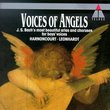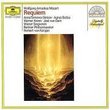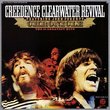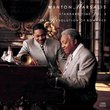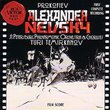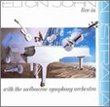| All Artists: Puccini, Price, Taddei, Karajan, Vienna Phil Title: Tosca Members Wishing: 0 Total Copies: 0 Label: Polygram Records Release Date: 10/25/1990 Genre: Classical Styles: Opera & Classical Vocal, Historical Periods, Modern, 20th, & 21st Century Number of Discs: 2 SwapaCD Credits: 2 UPC: 028942167025 |
Search - Puccini, Price, Taddei :: Tosca
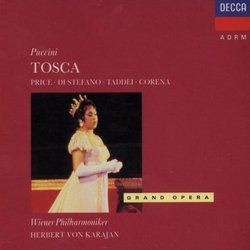 | Puccini, Price, Taddei Tosca Genre: Classical
|
Larger Image |
CD DetailsSimilarly Requested CDs
|
CD ReviewsLeontyne Price's 1963 Tosca: The First CD Release Rudy Avila | Lennox, Ca United States | 09/20/2005 (5 out of 5 stars) "This was the first compact disc release of Leontyne Price's 1963 Tosca which back in 1963 was released on LP. There are at least two other recordings of this same studio recording, one which is digitally remastered with "Super-Transfer" and is the best version available sound-wise. That particular one is under the 1963 Legendary Performances label. This recording lacks in lustre compared to the vivid freshness of the forementioned version. This recording is not too bad, though, and is a fine Tosca if you are able to get your hands on it. I just love the cover- Leontyne in her regal Tosca costume, looking as she did in her early performances of Tosca. Leontyne played the character very well, not at all hindered by the fact she was about the only black woman singing a role that had been "owned" by such white/Euruopean ladies as Maria Callas, Renata Tebaldi, Zinka Milanov and others. Leontyne Price was the first black opera superstar, singing through the 50's- a time of great suffrage for blacks. For Leontyne, Tosca was a piece of cake, when most sopranos learn and train for years to sing the role. Leontyne sang Tosca in a 50's televised performance that is rare to find. At the time she appeared on tv as Tosca in the South, she was faced with racist attitudes from producers who attempted to keep the performance from airing. Still, Leontyne shone brightly and found herself the equal to even Maria Callas, and in my own opinion, superior in voice and drama. This recording was a project launched by the eminent conductor Herbert Von Karajan, who championed Leontyne. Under his baton, she also sang an incredible Trovatore opposite Franco Corelli in the Salzburg Festival, a performance later repeated at the Met in 62 which was her grand debut, and also the debut of Corelli. This performance was recorded in Vienna, and the Vienna Philharmonic plays with passion and broad tempi, making it sound epic and bombastic, yet tender and dreamy. Karajan delivers magic as usual. The only weak links are, unfortunately, Miss Price's co-stars. Both Giuseppe Di Stefano and Giuseppe Taddei were miscast. It would have been much better for Karajan to have contracted a younger tenor and baritone. Franco Corelli, who had just wrapped up working with Leontyne in Trovatore could have been cast as Mario Cavardossi. What a fine Cavaradossi he makes, as the 1967 studio recording with Birgit Nilsson and Dietrich Fischer-Dieskau attests. Corelli was in fine voice in 63, and his involvement in this recording would have been sensational! Instead, we have the aging Di Stefano, who has seen better days as Mario Cavaradossi (look for his recordings with Callas and Tebaldi to hear him in better shape). Taddei, too, is weak as Scarpia, downplaying everything he sings, and failing to convince as a nasty, villainous, lusty, sadistic creature. He is just singing and not acting, and Scarpia must do both. Fernando Corena as the Sacristan is really a good thing, however, and he delivers. However, the only reason you should get this recording is for the sublime Leotyne Price. Her Act 1 performance: Leontyne UNDERSTOOD Tosca. She knew that Tosca, like herself, is a singer faced with tremendous obstacles. I like to think that Leontyne, while knowing the basic elements that surround Tosca's character (which is that she is jealous, passionate, religious, loving and emotional) she must have built upon her own experiences as a singer. It is possible that when Leontyne first began singing, before she was a star, she had rivals to compete with. Tosc has the Marchessa Attavanti to compete for Mario's love. See how she could have used this for interpreting the role ? Leontyne has long been a religious person, having sung in Churches in her native Mississippi. For her, the whole business of Tosca coming to pray to the Madonna in Church in Act 1 must have been easy. She sings with lush lyricism and breathtaking beauty, and her flashes of jealousy are like that of a tigress! Her Act 2 performance is mannered and controlled when compared to her later 70's recording under Solti's baton and singing opposite Domingo and Milnes. She is in control, despite the fact that in Act 2, Tosca is driven nearly mad with torture upon seeing Mario tortured. Her lines "Ah, non poso piu!" are excellent and her Vissi D'Arte is radiant and heartbreaking. The infamous scene in which she stabs Scarpia is delivered with aplomb, though it is all done at a brisk tempi. Her chest voice is not full or deep as it would be later, and for the most part her high notes are the real pleasure of this recording. Her final performance in Act 3 is exemplary. However, her realization that Mario is dead "Presto su Mario" is a little like a Mad Scene. All in all, it is a fine Tosca. It is Leotyne Price in a young voice and all fans of the great diva should own this recording." I am sorry...not the best tosca... Tanner J. Knight | greenbelt, md United States | 01/30/2006 (4 out of 5 stars) "i finally found this disk on the decca grand opera release. i was so excited, leontyne's first tosca, di stefano's last, karajan, culshaw...what could be better?! apparently everyone who has sung cavaradossi in the past 50 years, that's what. perhaps i am a bit biased being a tenor, however, old giuseppe was well past his prime, if there ever was one. my tenor friend michael tells me that di stefano in the 40's was a marvel to behold; "he makes corelli look like a little school girl", he says. well, that may be the case, however in september of 1962, our friend was canceling performance after performance due to vocal trouble. incidentally, that is how pavarotti got his big break the previous year for a televised boheme with covent garden, by stepping in for an incapacitated di stefano. getting back to the recording at hand: from cavaradossi's first notes, the listener asks with a panic...is he going to make it to the end?! of course, we know he does because this was right in the middle of culshaw's decca ring cycle, and even though this is italian opera, we know he would accept only the best. (imagine the tape his vienna crew had to sift through if these which made it onto the disk were the best takes!) having said that, the rest of the album is a dream. we have price singing one of the roles she made her's alone, along with that of aida, the verdi leonoras, and...well anything else she sang. this performance is preferable to her legendary domingo/milnes recording from the 70s because she is just in better voice, period. she is younger, fresher and completely in control. teddei is in top form here creating a loathsome, regal villain. the smaller parts are all well cast and well sung. i would feel remiss if i didn't single out piero de palma, singing spoletta with a real set of vocal cords, unlike some of the character tenors who were cast after the bulk of the budget had been spent on the big stars for the main roles in other recordings. de palma does a bang up job with everything he sings, though. corena also delivers the sagrestano, one of his smallest signature roles, with typical comic buoyancy. of course, it goes without saying that the vienna philharmonic in 1962 was the best orchestra on the face of the planet. however, it is worth mentioning again...and again, until all the non-believers are converted. karajan leads this brilliant ensemble with edge of your seat excitement and lots of sound, but always beautiful sound. given all the positives on this set, it is either a shame that either cavaradossi sings so much in this opera, or that di stefano just wasn't up to the challenge that late in his career. i am inclined to believe the latter. it pains me to give my favorite opera low marks because of the tenor, but that is just the case here. buy this tosca for the other elements, but supplement it with corelli, del monaco, pavarotti, domingo, and/or bjorling.
point of reference: i don't know if anyone else will care, but i found it interesting that nearly 20 years later, karajan met with taddei and de palma in his second recording of verdi's falstaff with teddei in the title role, and de palma singing another one of his signature comprimario roles, dr. cajus. longevity is golden in a career which sees flashes come and go every day." |

 Track Listings (10) - Disc #1
Track Listings (10) - Disc #1

